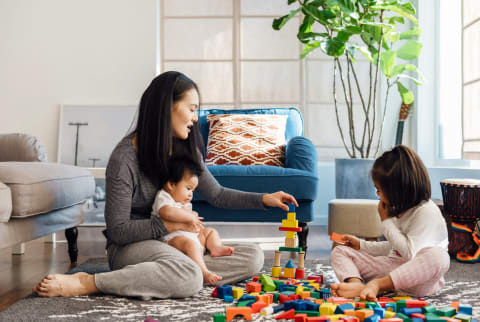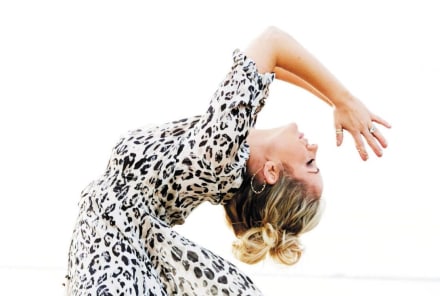Advertisement

Caretaking is still a woman's domain.
For all the advances modern technology, birth control, and feminism have given us, the so-called second shift in most homes across the world still falls to women, who are not only often the primary caretakers for children but also generally the household managers, upkeepers, and decision-makers. A United Nations report this year found women do some 2.6 times the amount of unpaid work that men do, including everything from physical tasks like cooking, cleaning, and picking up the kids from school to mental tasks like planning meals and vacations, coordinating schedules, figuring out logistics, remembering family birthdays and special events, and delegating chores.
Even as changing attitudes around gender and women's participation in the workplace have somewhat eased the gap between men and women's physical contributions to the house over the last several decades, women still generally bear the brunt of the emotional labor involved in making sure these domestic responsibilities are being fulfilled. When it comes to heterosexual partnerships, she's the one saddled with the responsibility, stress, and emotional burden by default, the one whose head space must be partially filled with the work waiting for her at home—the "overhead of caring."
But in addition to all the mental stress and exhaustion, it seems that emotional overhead may even be harming women's physical health. New research1 in the journal Sex Roles found perceiving an unfair division of labor at home was significantly associated with poorer health for busy married women who work. The catch? Their health wasn't being hurt because they felt they were unfairly doing too much of the work at home. It was because they felt they weren't doing enough.
Researchers interviewed and surveyed 1,871 women from 24 different countries; they all currently had children living at home and were in marriages in which both partners work full-time jobs. The questions asked how many hours they spent on paid labor and unpaid domestic labor and how equitably that domestic labor was distributed within their marriages, as well as about their physical health. Women who worked long hours in the office were more likely to report decreased physical health, and that relationship was moderated by the hours they worked in the house and how fairly that housework was divided.
"Demands from performing multiple roles may drain women's resources and likely result in increased strain. Household labor is demanding, involves effort, and draws from individuals' resources," the authors write. "Due to the gendered nature of household labor, which assigns the bulk of household chores to women irrespective of their employment status, juggling household labor demands when already tired from meeting paid work obligations may further threaten women's time-based and energy-based resources, leading to strain-induced health outcomes."
It's well-documented the way this kind of chronic stress can negatively affect the body. But fascinatingly, the findings showed women's physical health was the lowest when, in addition to long hours at work and at home, they felt that they contributed less than their fair share of household labor. In other words, women were experiencing negative health outcomes not because of all the hours they were putting in across both domains but because they felt guilty about not doing their fair share at home.
"A possible reason for this unexpected finding might be that women may feel that their job work hours hinder them from spending time on household work, which may stir up feelings of guilt, negative self-evaluation, and distress," the paper notes. "Women might feel guilt and empathy toward their spouses as well as a transfer of stress from their spouses."
Further proving the point, the study also found working long hours at jobs had an even stronger effect on physical health when women did less at home. That means even those women who toiled away in the office but for whatever reason didn't spend as much time on household upkeep also experienced their health deteriorating. Women, it seems, have been so socialized to be homemakers that it's now causing them to experience guilt when they don't expend ample amounts of time and energy on the house and family—and that guilt may actually be affecting their physical health.
How can we relieve women of this emotional burden that's so negatively affecting them across so many areas of their life? Tackling the emotional labor divide within a marriage is no easy task: It goes beyond just creating a list of chores for each person to complete. It requires two partners in a relationship to have a serious conversation about what their roles in the family are, and it requires the people in relationships with women to step up and find ways to wholeheartedly take on some of that responsibility—not just the physical tasks but the "overhead of care" that comes with it.
For women, an immediate step after talking to your partner should be developing a deep sense of self-awareness and self-forgiveness around the work you do for your family and your home. A little bit of guilt isn't inherently a bad thing—it shows earnest care and compassion for the people around you, and that's something to celebrate about yourself—but it must be anchored in an equally earnest acceptance of yourself and your limits. In a world eager to place more and more thankless burdens on women's shoulders, knowing when to say "I've done enough" is a vital part of self-care.
Watch Next
Enjoy some of our favorite clips from classes
Enjoy some of our favorite clips from classes
What Is Meditation?
Mindfulness/Spirituality | Light Watkins
Box Breathing
Mindfulness/Spirituality | Gwen Dittmar
What Breathwork Can Address
Mindfulness/Spirituality | Gwen Dittmar
The 8 Limbs of Yoga - What is Asana?
Yoga | Caley Alyssa
Two Standing Postures to Open Up Tight Hips
Yoga | Caley Alyssa
How Plants Can Optimize Athletic Performance
Nutrition | Rich Roll
What to Eat Before a Workout
Nutrition | Rich Roll
How Ayurveda Helps Us Navigate Modern Life
Nutrition | Sahara Rose
Messages About Love & Relationships
Love & Relationships | Esther Perel
Love Languages
Love & Relationships | Esther Perel


















